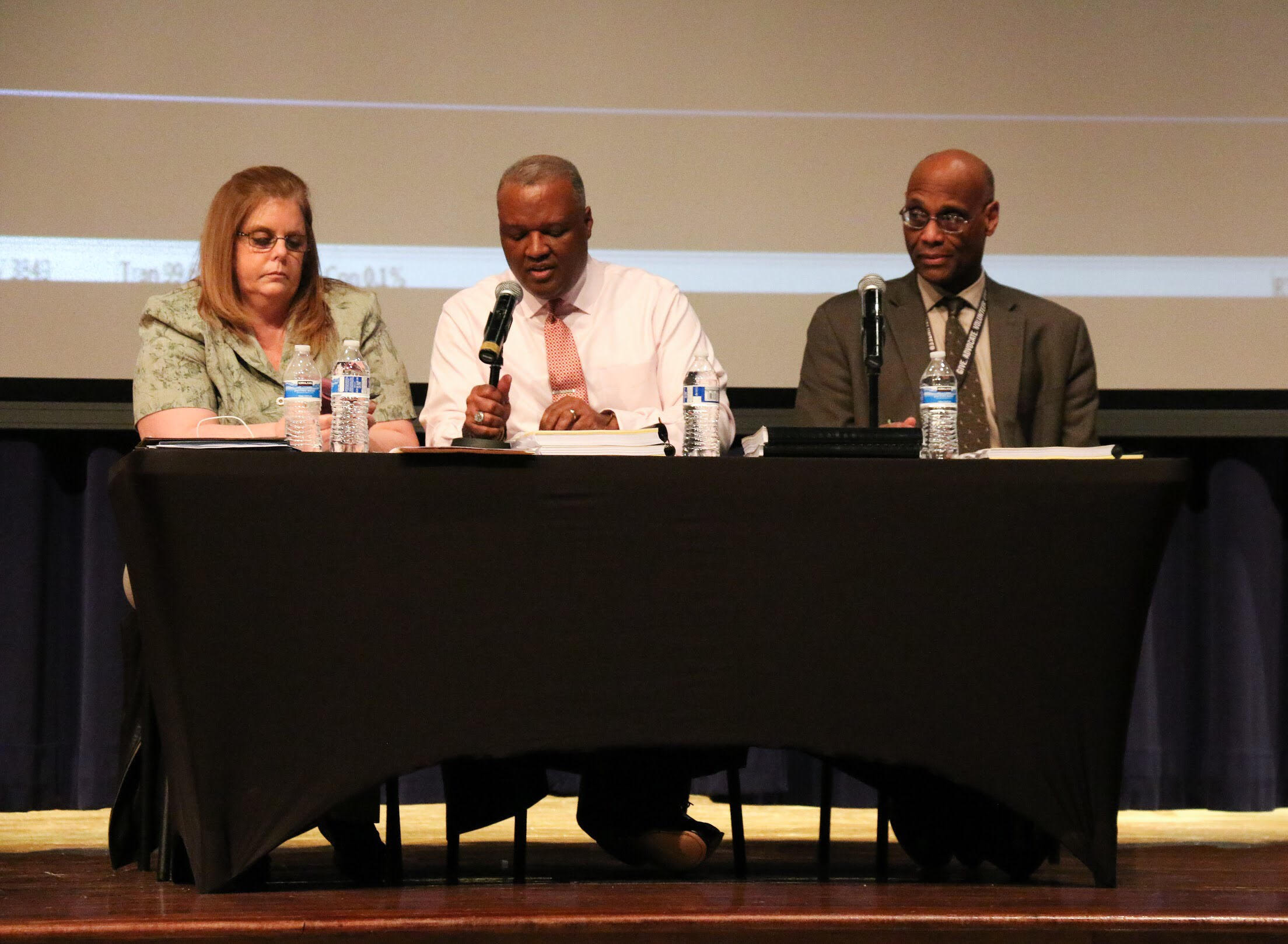Prince George’s County officials gathered Tuesday to hear resident suggestions and criticisms of the county’s fiscal 2019 budget, such as the need for more affordable housing and support for small businesses.
Prince George’s County Executive Rushern Baker, as well as members of the county’s Office of Budget and Management, listened as residents gathered at Laurel High School to give testimony about the county’s allocations of funds.
Baker will submit his proposed fiscal 2019 spending plan to the county council on March 14, and the budget will take effect on July 1 of this year.
Testimony topics ranged from affordable housing to the need for increased funding for libraries in northern Prince George’s County. Many residents expressed appreciation toward Baker and the county for supporting various initiatives within the county, while others implored Baker to provide more funding and support for various county programs.
[Read more: A Hyattsville Race and Equity Task Force aims to unite the city]
Alison Flores, the policy and community director for District 2 Councilmember Deni Taveras, said in her testimony that some of the biggest complaints among District 2 residents include overcrowding, parking congestion, traffic and inadequate infrastructure.
She said investments in public amenities such as safe pedestrian pathways and urban parks would help make the county more family-friendly.
“We must be committed to ensuring that Prince George’s County is a welcoming place for all visitors and residents alike to play, pray and work,” Flores said.
Flores added that she would like to see the county make further investments in affordable housing, arts and education programs, pedestrian pathways and small business retention.
In 2016 the Prince George’s County Council developed a Comprehensive Housing Strategy, which aimed to manage the county’s housing investments and build “sustainable, diverse and inclusive communities connected to economic opportunity,” according to the county website.
District 8 resident Mark Johnson, CEO of MOA Enterprises — which provides assistance for disadvantaged individuals and businesses — said that he is pleased overall with county programs designed to help minority businesses.
The county’s Economic Development Corporation offers support to local and minority-owned businesses through its Small Business Services division.
Johnson added, however, that he’s noticed some small business owners in the county have difficulty locating and navigating these programs, which he says are not user friendly.
“The result is that we can find ourselves spending months pursuing opportunities that may not exist, or that should be accessed in a manner different than we have been led to believe,” Johnson said.
“Even with all the initiatives available to residents and business owners, being successful remains challenging for the intended underrepresented populations,” he added.
Alice Bishop, former president of the Templeton Knolls Civic Association, said in her testimony that Templeton Elementary School is in “critical need” of a community resource advocate to assist students. She said the school, which is located in Riverdale, has a diverse array of students that represent more than 30 countries and speak 26 different languages.
Many of the students are refugees that have limited proficiency in the English language, she said.
“With such a diverse population, our students have some very unique academic, social and emotional needs,” Bishop said. “Having a community resource advocate to join the team will positively impact our efforts to make each Templeton Tiger great.”
Michael Chesnes, who said he volunteers with the Howard B. Owens Science Center in Lanham, urged the county to invest $2 million to upgrade the planetarium, which he said is losing some functionality and lacking spare parts.
“As well built as it is, our planetarium is already past its expected life,” he said.
[Read more: Prince George’s County Executive Rushern Baker honored for supporting Hispanic businesses]
Other testimony came from those who use Laurel Advocacy and Referral Services, also known as LARS, which provides assistance and emergency services to county residents to prevent evictions, help with expenses such as rent and provide supporting housing.
One resident, who identified himself as Ross Hughes, said he faced homelessness before LARS stepped in. He said his reason for testifying Tuesday was to ensure LARS continues to be funded.
Baker said the county will continue to be “vigilant” in monitoring revenues and expenditures throughout this year to ensure the budget remains balanced. He said funding for the county’s Transforming Neighborhoods Initiative, which aims to bolster communities in the county that face economic, educational and public safety challenges, would be a priority.
“This is my last budget hearing as your county executive,” Baker said. “I want to publicly thank everyone in Prince George’s County for giving me the opportunity to serve as your county executive.”



